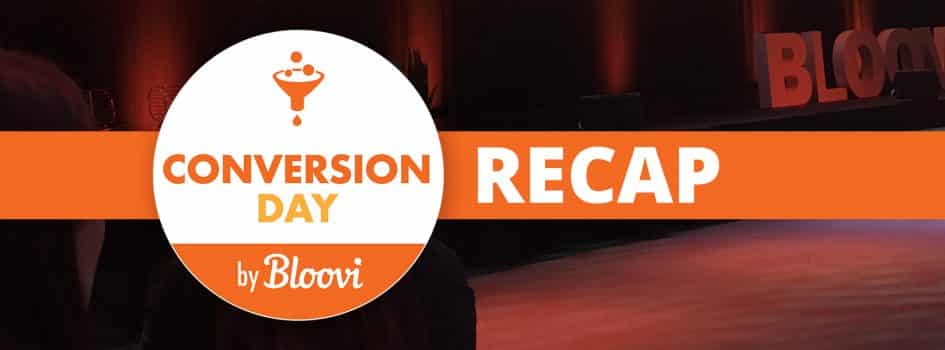The vision of the event is to help marketers boost conversions by providing them with practical know-how which can be implemented immediately. With this in mind, we arrived at the impressive venue Autoworld Brussels to hopefully learn a lot and get reassurance that we’re on the right track with our way of working.

Bloovi always takes care of their attendees, so we started with some breakfast while wandering through the Autoworld and seeing some of the coolest cars from the past. After the opening by Pieter Baert, a German called Andre Morys took the stage.
The Growth Canvas
Although being the first speaker of the day, Andre Morys started strong and gave interesting and applicable tips. One of the first lessons was to not directly copy ways others became successful, but to build your own ‘success factory/goldmine’ for conversion optimization.
Andre stated two important things when optimizing: reduce friction and raise motivation on pages and funnels. Look at your data and try to understand your users because they will make or break. In addition to that he tipped to use cognitive biases (10 interesting biases explained) and use these principles to sell more. The most important is to make a business plan to allocate budget for optimization.

Is your web copy converting?
Amy Harrison made clear that most of the web copy she sees has two problems: the business’s value is buried somewhere at the end of the page and it is too much about the company. According to Amy, companies end up with ‘cheating copy’. How to recognize if your copy is cheating: you see it on other websites as well and the usage of umbrella terms is high. How to tackle this: use an umbrella term with what users love about your company. Look into reviews, this is a really helpful tool! In addition: get rid of unclear and vague writing. If you want to test if your writing is clear, use the 5-sec test.
Make people care about your product/service. A very interesting tactic is to address problems customers don’t know by using symptoms in the web copy. Most other web copies will use problems and cures but if you use symptoms and cures to get more attention. In addition, highlight the risk of not using your services and be consistent in communicating the impact. It is important to put the interesting content on a visible place on the page and don’t bury it down below.
The 7 pillars of Growth hacking to boost your conversions
After a short break, it was time for Chris Out from Rockboost. One of the topics he talked about were the 7 pillars of Growth Hacking:
- Create or have a ‘growth mindset’: Always have room for improvement, embrace challenges, effort is essential, feedback is useful and setbacks are part of the deal to work harder next time.
- Team: Build multidisciplinary growth team. All members should know the basics of their colleague’s specialty. Create or have members with T-shape knowledge to have a higher understanding in each other’s way of thinking and problems.
- Measurement: Keep track on what is happening and why. If you can’t measure what’s happening, you will never know what went wrong or right.
- Listen to the market: Set up a customer desire map and take in account that 20% of your customers are responsible for 80% of your revenue.
- Product market fit: Get your product as fit to the market as possible by removing possible hesitations or doubts.
- Traction: Find out where your customers are coming from and which of the 19 different traction channels is most effective!
- Optimize: Set hypotheses, based on data/feedback, expected change and impact combined with measuring data. Chris advised us on using the Lift Model by Chris Goward.
The impact of GDPR on online marketing
After lunch it was time for one of the most exciting talks of the day: How the GDPR (the new European data protection regulation) is going to impact online marketing. The talk adopted the format of an interview with three experienced marketers as the guest talkers. Although lots of questions popped up during the interview, there were three points that really got our attention:
- 40% of Belgian companies aren’t aware of the impact the GDPR is going to have on their business.
- Data mapping: Companies, that want to be GDPR compliant, should start with data mapping (listing all the personal data they have) and figure out, if that data is being processed according to the GDPR provisions.
- Be careful with your service providers: Lots of providers, especially those overseas, don’t have a clue about the GDPR, so make sure you choose a provider that is GDPR compliant.
Don’t worry if you haven’t had a look at the GDPR yet. The new regulation will only be applicable starting May next year, so you still have a few months to meet the deadline. Make sure you read the series of articles about data protection and online marketing which Thorsten Olscha just started.
Web psychology
Probably one of the most successful talks of the day was the one held by web psychologist and bestselling author Nathalie Nahai. Nathalie gave us a few tips on how to improve user experience and increase conversion rates with the help of seven psychological principles. The web is not only numbers flowing around, users (people) are also a part of it and understanding what drives users to perform – or don’t – a certain action can help us improve our online presence. Really interesting topic with a bonus: if you want to learn more about it, go on Amazon and buy Nathalie’s book Webs of Influence.
Make your website user friendly
After Nathalie it was time for AGConsult’s cofounder Karl Gilis, one of the most influential CRO-experts in the world, according to PPC Hero. Karl is a perfect combination of expertise and humor, there is no way you can leave the room without laughing your brains out, believe it. His talk focused on website usability and how to make your users happy. The key concept of the talk can be resumed like this: Start by understanding your users and then build your online presence according to your users’ needs. If you want to know more about Karl and his company, make sure you visit AGConsult’s website or follow him on Twitter.
Paid attention
The last speech of the day was given by Genius Steals’ cofounder Faris Yakob. Faris’ part focused on the importance of attention in the advertising industry. Advertisers fight to get the perfect spot and eventually the user’s attention. But are they actually applying this rule when they’re campaigning? If you want to find out more about this interesting topic, you have two options: Visit Genius Steals‘ website or buy Faris‘s book Paid Attention (or both).
Key takeaways of the day
- Do not copy others, find your own success factory and use the cognitive biases for your success.
- Get rid of cheating copy, use reviews/client research and make symptom/cure combination when writing web copies for the visible part of your pages.
- Set up Growth Hacking with a system.
- In Belgium still 40% of the companies aren’t t aware of the impact of GDPR, so start mapping your data to get compliant and make sure your service providers are too.
- Use psychological principles to improve user experience and increase conversion rates.
- Understand your customers, build your website around their needs and they will convert.
Today we definitely heard a lot of interesting things that will not only help us to advise our clients but also to implement in our own day-to-day work. We will definitely try to go back next year!




